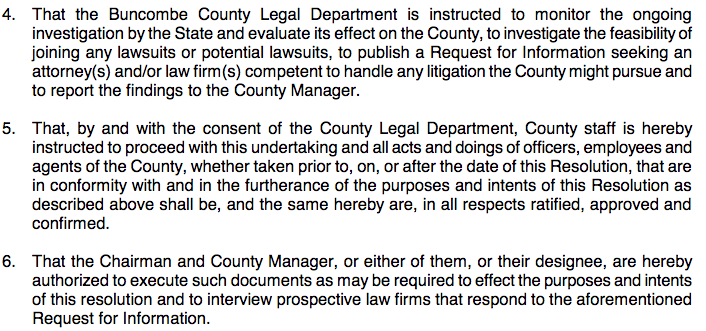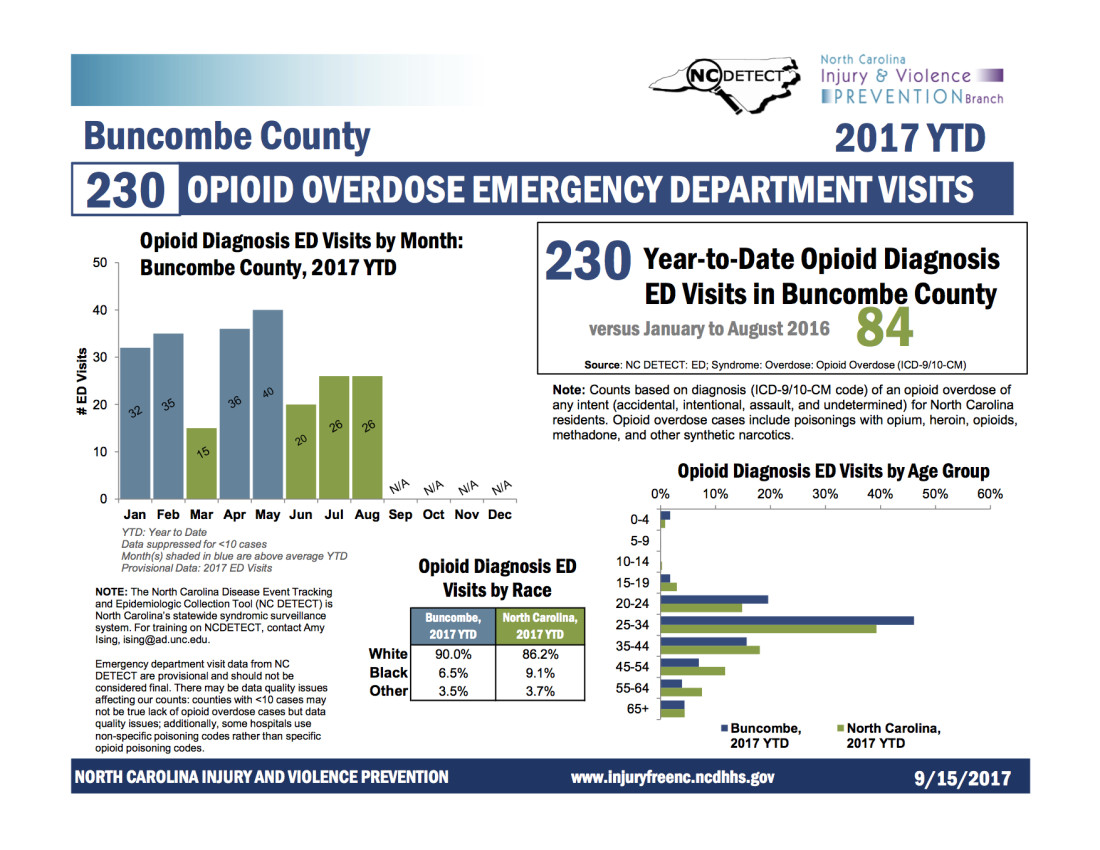The Buncombe County Board of Commissioners put Big Pharma on notice with a unified front during its meeting Sept. 19. New statistics from the N.C. Division of Public Health show that at the end of August, Buncombe County had 230 opioid-related emergency department visits. Last year, through the same time, the county had 84 such incidents, according to the data. That represents a 173 percent increase.
Last month, statistics from county Emergency Medical Service stated there have been about 520 responses related to overdoses and poisonings through the first half of the year. By comparison, Buncombe EMS responded to about 700 last year and just over 500 in 2015.
In response to those numbers, Buncombe County will explore litigation against painkiller manufacturers. “This is a very grave issue facing our community right now,” said Commission Chair Brownie Newman. “We are trying to understand what positive difference we can make at a local level. It’s beyond the scope of one organization or government, but we want to do what we can.”
County Social Services Director Tammy Shook addressed commissioners about the effect opioids are having on her department. “Seventy percent of kids going into foster care do so because one or both parents have substance abuse problems, and 46 percent of those children are under the age of 6. It’s tearing the fabric of our family and communities apart,” she said. “We don’t have the resources to take care of them.”
Shook noted that the county has partnerships with local organizations like the Mountain Area Health Education Center and Western Carolina Rescue Mission to help mitigate the overflow of infants and mothers needing addiction treatment. “I fully support holding those [drug companies] accountable for this, and they should share in a societal role to address it,” she told commissioners.
Jim Barrett, executive director of Pisgah Legal Services, also supported the potential litigation. “I don’t understand why you’d be prescribed 30 Percocets for your wisdom teeth to be removed. Why does [insurance] pay for that and don’t pay for a lot of other things?” he asked.
“We are determined to join with federal and state agencies and encourage their efforts in this type of lawsuit. We are determined it will not be the only step we take,” said Commissioner Joe Belcher. “This will not be the last time we talk about this. Unfortunately, next time we talk about this, some folks will have lost their lives. So we will be determined.”
Commissioner Al Whitesides noted the potential litigation was a way to “attack” the problem. “When you look at these major drug companies that made billions over last 25 to 30 years, it’s only fair we ask them to come back and help us pay the bill for people we need to treat now.”
“The one thing that really disturbs me is when someone thinks about the [lawsuit] cost over saving a life,” added Commissioner Robert Pressley. “Anybody that thinks about cost over what lives we can save here, I really feel sorry for them.”
Commissioner Mike Fryar noted that sheriff’s deputies and firefighters now carry Narcan, an opioid overdose reversal medicine. “This [opioid overuse] is the worst thing going. It’s killing people every day. … It’s time for us to step up, put it out to these law firms and see who steps forward to help Buncombe County.”
“The step we are taking tonight is not to file a lawsuit … but we will take next steps to consider how to pursue that,” added Newman.
Language in the resolution states:
“That it recommends legal action be taken and compensation be sought by the state of North Carolina on behalf of North Carolina counties if it is found that painkiller manufacturers have engaged in unlawful practices in the marketing and selling of opioids. That, notwithstanding its recommendation above, the County of Buncombe intends to investigate the feasibility of taking legal action itself against prescription painkiller manufacturers.”

You can read the entire text of the resolution here.
Commissioners unanimously approved the resolution.
Earlier this year, Xpress ran an in-depth report looking at the opioid crisis as a health, rather than a criminal issue. You can read “Cure for pain: Preventing opioid-related deaths” here.




The pharma companies have a lot to answer for, but if a dental surgeon is sending patients away with a bottle of Percocets, isn’t that a problem with providers? It’s a false comfort to want legal redress against faceless corporations based far away: it’s the nice friendly neighborhood doctor who’s a pillar of the local community writing out the scripts because that’s what is demanded, and if that doctor won’t do it, another doctor will.
There’s a balance to be struck in pain management, and the incentives are currently tipped towards fixes in pill form over things like physical therapy that require time and engagement. Panelists at the MedX conference last weekend talked about how Americans are collectively over-prescribed narcotics while those in need of pain meds often have trouble getting them:
http://scopeblog.stanford.edu/2017/09/17/misconceptions-about-opioid-use-a-medicine-x-discussion/#sthash.e2qKZa0v.uxfs